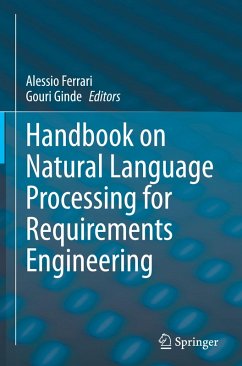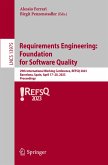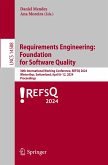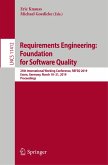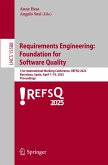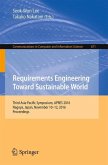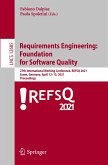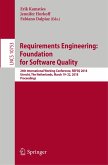This handbook provides a comprehensive guide on how natural language processing (NLP) can be leveraged to enhance various aspects of requirements engineering (RE), leading the reader from the exploration of fundamental concepts and techniques to the practical implementation of NLP for RE solutions in real-world scenarios.
The book features contributions from researchers with both academic and industrial experience. It is organized into three parts, each focusing on different aspects of applying NLP to RE: Part I - NLP for Downstream RE Tasks delves into the application of NLP techniques to tasks that are typically part of the RE process. It includes chapters on NLP for requirements classification, requirements similarity and retrieval, requirements traceability, defect detection, and automated terminology and relations extraction. Next, Part II - NLP for Specialised Types of Requirements and Artefacts explores how NLP can be tailored to handle specific requirement types and artefacts. The chapters cover legal requirements processing, privacy requirements acquisition and analysis, user feedback intelligence, mining issue trackers, and analysis of user story requirements. Eventually, Part III - NLP for RE in Practice addresses practical applications and tools for implementing NLP in RE. It includes a chapter on the different tools that use NLP techniques for RE tasks, followed by chapters on empirical evaluation of tools, practical guidelines for selecting and evaluating NLP techniques, guidelines on using Large Language Models (LLMs) in RE, and dealing with data challenges in RE.
The book is designed for a diverse audience, including Ph.D. students, researchers, and practitioners. Ph.D. students can benefit from a comprehensive guide to the topic of NLP for RE and acquire the essential background for their studies. Researchers can identify further triggers for scientific exploration, based on the currently settled knowledge in the field. Eventually, practitioners facing challenges with NL requirements can find practical insights to enhance their RE processes using NLP.
The book features contributions from researchers with both academic and industrial experience. It is organized into three parts, each focusing on different aspects of applying NLP to RE: Part I - NLP for Downstream RE Tasks delves into the application of NLP techniques to tasks that are typically part of the RE process. It includes chapters on NLP for requirements classification, requirements similarity and retrieval, requirements traceability, defect detection, and automated terminology and relations extraction. Next, Part II - NLP for Specialised Types of Requirements and Artefacts explores how NLP can be tailored to handle specific requirement types and artefacts. The chapters cover legal requirements processing, privacy requirements acquisition and analysis, user feedback intelligence, mining issue trackers, and analysis of user story requirements. Eventually, Part III - NLP for RE in Practice addresses practical applications and tools for implementing NLP in RE. It includes a chapter on the different tools that use NLP techniques for RE tasks, followed by chapters on empirical evaluation of tools, practical guidelines for selecting and evaluating NLP techniques, guidelines on using Large Language Models (LLMs) in RE, and dealing with data challenges in RE.
The book is designed for a diverse audience, including Ph.D. students, researchers, and practitioners. Ph.D. students can benefit from a comprehensive guide to the topic of NLP for RE and acquire the essential background for their studies. Researchers can identify further triggers for scientific exploration, based on the currently settled knowledge in the field. Eventually, practitioners facing challenges with NL requirements can find practical insights to enhance their RE processes using NLP.

